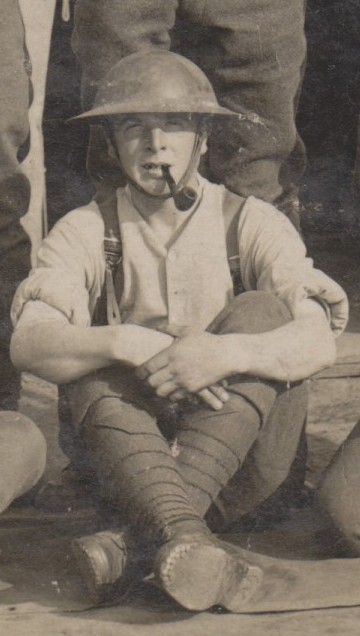
This story was submitted by Mr Johnson of Richmond, he is the grandson of John Ramsden.
John was born in East Ardsley, Leeds. He was called up in 1917 and trained at Chelmsford. He was posted with the 6th Battalion, Durham Light Infantry as 78916 Pte J Ramsden. John kept a diary during his time away from home. On 6th February 1918 at Passchendale Ridge he recorded “Shells are whistling menacingly overhead, I hope my God will give me the strength to withstand the trials that beset me!”
21st March 1918 saw the last big German attempt to win the war. John’s diary reads, “Found a fellow I’ve seen very often laid out of the trench – grim and bloody – ah, yes but smiling in death”.
John was wounded on 28th March and was evacuated to Rouen with other casualties. On 31st March he wrote, “The Doc prodding my head with an instrument much like a pair of sugar tongs. Eventually succeeds in extracting a small piece (but quite big) of the product of Essen”.
After recovering, John was sent back into the line in late May. Again he was hospitalised, this time in an American hospital, taking a serious wound to the hand. The family always believed that the different approach taken by American surgeons saved John’s hand from amputation.
John survived the war and moved to Barnsley, running the local cinema and writing a column for the Barnsley Chronicle.
Explore more memories from the ribbon
-
John M Hewison
John Matthew Hewison lived in Penshaw and enlisted at the start of the war at Shiney Row. He was the son of Matthew and Anne Hewison of Shiney Row and he was married to Agnes. He would have left for France in late August 1915 and the 8th Battalion would have been involved in training and undergoing acclimatisation visits to the front line when he was killed in action on September 22nd. 14961 Private John Hewison died at the age of 22 and had been in France for only 3 weeks. He was awarded the 14/15 Star, the British War Medal and the Victory Medal. His wife inherited his effects of 14s/4d and a gratuity of £3-10s. He was buried at Brewery Orchard Cemetery, Bois-Grenier.
-
Gosnay William Riley
Diane Hawthorne sent in a request for us to look into her grandfather’s First World War service – this is what we managed to discover. Gosnay William Riley attested on 10th December 1915 into the 11th Battalion Yorkshire Regiment at Brighouse and was assigned the regimental number 27654. The 11th was a Home Service Battalion dealing with Drafts and Reinforcements. In September 1916 the 11th amalgamated with the 16th Durham Light Infantry as a Training Battalion thereby losing its distinct identity. At some time prior to this Gosnay transferred to the 10th Battalion Yorkshire Regiment. He had been promoted to the rank of Corporal. Sometime thereafter he transferred to the 9th York and Lancaster Regiment. His Regimental number was 34441. On the 3rd March 1919 he became a reservist in the British Army with many thousands of others.
-
Captain Frank Woodcock
Captain Frank Woodcock 5th Battalion of the Yorkshire Regiment Captain Woodcock, who was only 22 years of age, was the youngest son of John and Elizabeth Woodcock of Driffield Yorkshire. He was killed in action during an assault on the 15th of September 1916. Frank was one of 6 children having 2 brothers and 3 sisters, the family must have been “comfortably off” because the 1901 census records his father as “living on his own means” and they had a servant called Margaret. He was educated at Bridlington School, where he was in the Officer Training Corps (O.T.C.). He became a Second Lieutenant in a Territorial Battalion in December 1912. He was promoted Lieutenant in April 1914 and then to Captain in May 1915. The Regimental Gazette recorded his death as follows: “The death of Captain Woodcock deprives his battalion of a very capable Company Commander and a very popular Officer. Despite his youth, he very soon proved himself an Officer of much resource and dauntless courage. He was wounded when wiring in front of the trenches in July 1915, and returned to France in January 1916 when he succeeded to the command of a Company. It was in this capacity that he showed himself a cool and capable Commander with great initiative and pluck, always setting a fine example to his men when any dangerous work had to be performed. He was twice mentioned in despatches. Captain Woodcock is buried at Flatiron Copse cemetery in France.
